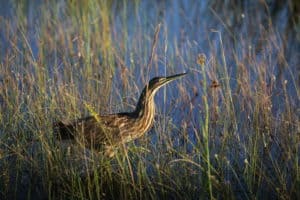
American bittern
Image credit: cuatrok77
A proposal to reinstate the longstanding interpretation of “take” under the U.S. Migratory Bird Treaty Act to include incidental take of covered migratory species was recently announced by the U.S. Fish and Wildlife Service. You can support the work of wildlife professionals conserving migratory bird populations by providing your thoughts and expertise in response to this important rulemaking.
The Migratory Bird Treaty Act guides the protection and management of more than 1,000 migratory bird species across the United States. Born out of the 1916 treaty, it is one of the United States’ oldest and most significant wildlife-focused laws. You can learn more about the underlying law from TWS’ Policy Brief Series.
This new round of rulemaking is in response to a rule originally finalized in January 2021 that prevents the U.S. Fish and Wildlife Service from regulating incidental or accidental taking of migratory species listed under the Act. The new proposal would rescind this finalized rule, and allow the U.S. Fish and Wildlife Service to once again regulate incidental taking of these species.
Take Action!Support science-based management and conservation of migratory birds Submit comments to the U.S. Fish and Wildlife Service on a proposed rule to reinstate the longstanding interpretation of “take” under the Act. Submit your comments at Regulations.gov |
TWS encourages wildlife professionals to comment on the rule, lending your wildlife conservation expertise in the crafting on meaningful federal conservation regulation. This new proposed rule acts as an extension of the February and March 2021 comment period that delayed implementation of the January 2021 final rule. Units and individuals that provided comments during the February and March 2021 comment period do not have to submit comments for this new rulemaking process, as their original comments have yet to be considered.
See below for talking points based on TWS headquarters and unit correspondence that can be helpful when drafting your comments. Comments will be accepted by the U.S. Fish and Wildlife Service until June 7, and can be submitted via regulations.gov. Please feel free to include your own professional positioning in these comments, and remember, you are the expert!
- As a wildlife professional working to conserve America’s native species, I recommend the U.S. Fish and Wildlife Service finalize this rule and renew the longstanding interpretation of take under the Migratory Bird Treaty Act.
- Since 1970, North America has lost more than 2.9 billion birds – about 30% of the continent-wide total. Each year, an estimated 64 million birds are incidentally killed by power lines, with an additional five million killed by communications towers and nearly 600,000 by wind energy operations.
- The decades of administrative and diplomatic interpretation of the Act have enabled regulation of incidental take, providing industry the incentive it needs to work with the U.S. Fish and Wildlife Service and other wildlife professionals to implement and improve conservation and mitigation practices.
- In order to work towards productive partnerships with industry partners, I encourage the U.S. Fish and Wildlife Service to explore the creation of an industry permitting program that would allow for incidental take of MBTA-listed species when adhering to best management practices.
For additional thoughts and ideas on how to respond to the proposal, check out TWS and TWS unit comments already submitted on this rulemaking below:
- Comments submitted by The Wildlife Society (24 February 2021)
- Comments submitted by the Southern California Chapter of The Wildlife Society (26 February 2021)
- Comments submitted by the San Francisco Bay Area Chapter of The Wildlife Society (28 February 2021)
- Comments submitted by the Western Section of The Wildlife Society (1 March 2021)
- Comments signed onto by over 250 conservation organizations, including TWS headquarters and several TWS units (1 March 2021)
Questions on how to best engage? Reach out to policy@wildlife.org.


